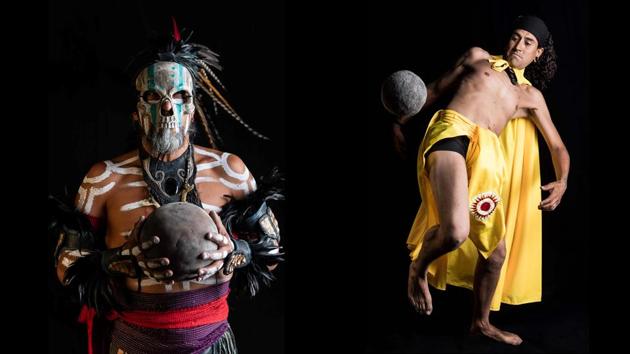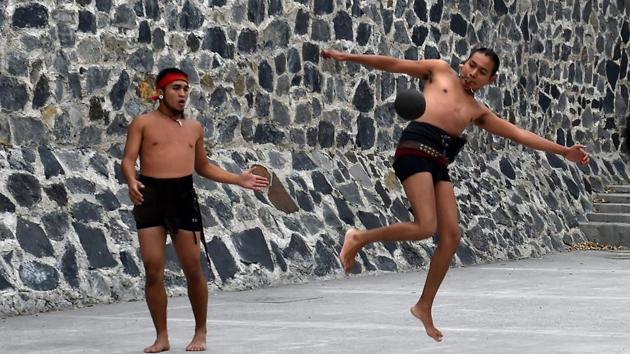Photos: Aztec ballgame returns to Mexico City after 500 years
Updated On Sep 06, 2019 02:05 PM IST
Five centuries ago, newly arrived in what is now Mexico, the Spanish conquistadors banned an indigenous game involving a heavy ball, circular stone goals and human sacrifice.Now, a group of young players are bringing the game back to life for the first time in Mexico City -- without the human sacrifice -- at the site of an old garbage dump.The players proudly tie thick leather belts around their waists as they prepare to play "ulama," as the game is known in the Nahuatl language: a mixture of sport, ritual and ceremony whose promoters are now using it to help at-risk youth in a downtrodden neighborhood on the Mexican capital's north side.
1 / 8

Updated on Sep 06, 2019 02:05 PM IST
A dancer representing “Mictlantecuhtli” (deity of the dead in the Mexica mythology) and a player of “Ulama” during a photo session. Pre-Columbian ballgames dating back thousands of years were once played across a broad swathe of the Americas by civilizations including the Mayas, Incas and Aztecs, and they have been revived elsewhere in Mexico and the region in modern times. (Omar Torres / AFP)
2 / 8

Updated on Sep 06, 2019 02:05 PM IST
Dancers perform ahead of a game of Ulama at the FARO Poniente cultural center in Mexico City. This is the first time in half a millennium that there has been a place in Mexico City to play the game known in Spanish as ‘juego de pelota.’ Emmanuel Kakalotl, who coaches players at the cultural center where the new ulama court was built said, “The game had been forgotten... It was toppled 500 years ago, but now we’re raising it up again.” (Rocio Vazquez / AFP)
3 / 8

Updated on Sep 06, 2019 02:05 PM IST
In pre-conquest Mexico, ulama was played in various contexts, including fertility rituals and wars. The court was a highly symbolic realm, representing the duality of the universe. But the outcome was very real for the players, who risked being sacrificed, usually by decapitation. The ritual died out soon after the Catholic conquistadors arrived, in 1519. (Rocio Vazquez / AFP)
4 / 8

Updated on Sep 06, 2019 02:05 PM IST
Wearing their traditional belts and loincloths, his players hit the nearly four-kilogram rubber ball with their hips, trying to send it through a vertical stone ring six meters (20 feet) high. The game is played by teams of one to seven players. Centuries ago, they were all men. But here, the game is open to women, too. (Rocio Vazquez / AFP)
5 / 8

Updated on Sep 06, 2019 02:05 PM IST
Elena Garcia (L), a pre-game ceremonial and dancer representing “Aquetzalli Tlayotzin” (precious water heart of the earth) and Beatriz Campos(R), an ulama player during a photo session at the FARO Poniente cultural center. “We’re women-warriors at heart, because it isn’t easy. Not just anyone can play this sport. It takes a lot of practice, and your body takes a beating,” said Campos, 25. (Omar Torres / AFP)
6 / 8

Updated on Sep 06, 2019 02:05 PM IST
Beatriz Campos performs the “Copal” ceremony ahead of a match. “The game and its religious connotations changed over time… When the Spanish arrived, because of the political and religious aspects of the ballgame, it was probably one of the first things they banned,” said Annick Daneels, an expert on pre-Columbian ballgames at Mexico’s UNAM university. (Omar Torres / AFP)
7 / 8

Updated on Sep 06, 2019 02:05 PM IST
It was never played again in what had been the Aztec capital, Tenochtitlan -- until the cultural center, looking for projects to revive the site of an old garbage dump, decided to build an ulama court. Players take the game very seriously. No alcohol or smoking is allowed at the court. For some, ulama is an escape from drug addiction or a history of crime. (Rocio Vazquez / AFP)
8 / 8

Updated on Sep 06, 2019 02:05 PM IST



